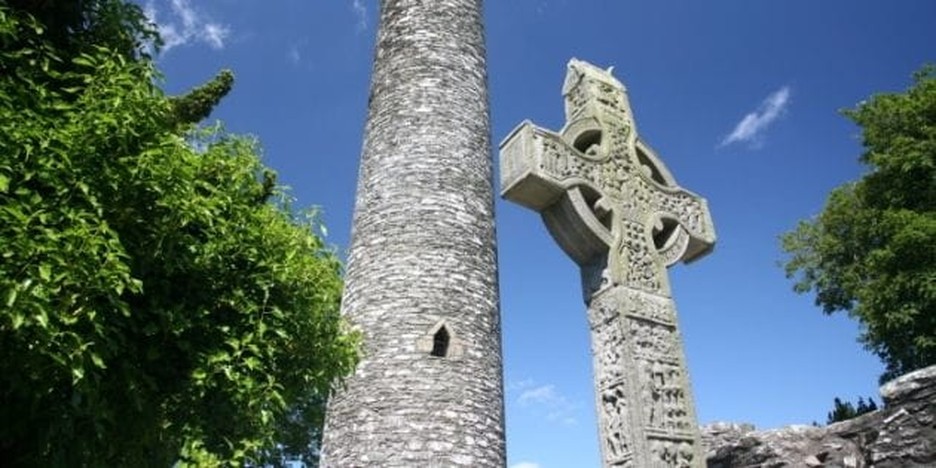
We live in a time of the anti-hero. Too often, the good guys are the bad guys and vice versa. Celebrities are often held up as heroes, until we learn too much about them.
But to see a true hero, look at the real St. Patrick, who has a day dedicated in his honor. Unfortunately, many people only observe his holiday, March 17, by drinking themselves silly, which is totally contrary to the spirit of the man who Christianized Ireland.
In fact, Patrick shows what God can do through someone who is committed fully to Him.
Thomas Cahill, author of the book, How the Irish Saved Civilization: The Untold Story of Ireland’s Heroic Role from the Fall of Rome to the Rise of Medieval Europe, notes that Patrick and the Irish came at the moment of a cultural cliff-hanger and played a key role in helping to save civilization.
In the 5th century, barbarians overran the Roman Empire---which was the repository of much of Western civilization---until it finally collapsed. Meanwhile, through the missionary work of Patrick (387-461), the gospel was brought to Ireland; and numerous men became monks as a result, who meticulously copied manuscripts of the Bible and of many of the writings of antiquity.
Cahill writes: “For, as the Roman Empire fell, as all through Europe matted, unwashed barbarians descended on the Roman cities, looting artifacts and burning books, the Irish, who were just learning to read and write, took up the great labor of copying all of Western literature---everything they could lay their hands on.”
He notes, “These scribes then served as conduits through which the Greco-Roman and Judeo-Christian cultures were transmitted to the tribes of Europe, newly settled amid the rubble and ruined vineyards of the civilization they had overwhelmed.”
Cahill adds, “Without this Service of the Scribes, everything that happened subsequently would have been unthinkable. Without the Mission of the Irish Monks, who single-handedly refounded European civilization throughout the continent in the bays and valleys of their exile, the world that came after then would have been an entirely different one---a world without books. And our own world would never have come to be.”
The man at the center of all this was St. Patrick.
Many of the details of his life we learn through a document he wrote late in his life, Confession. This was not a book of confessions of his sins, but rather a statement of his beliefs. It is autobiographical in nature.
Patrick (to the surprise of many) was not Irish by birth, but rather grew up in England as a nominal Christian. He said in Confession, “I did not know the true God.”
At the age of 16, marauding Irish pirates laid waste his city and captured slaves, including Patrick. Later he would write of this: "As a youth, nay, almost as a boy not able to speak, I was taken captive, before I knew what to pursue and what to avoid."
Patrick said, “I was taken into captivity to Ireland with many thousands of people---and deservedly so, because we turned away from God, and did not keep His commandments."
For six years, he worked as a slave for a landowning chief. Cahill notes that during this time, Patrick had two companions---hunger and nakedness.
While he served as a shepherd, he remembered his prayers of his youth and came to know God truly through Christ. After six years of captivity, he was able to providentially escape from Ireland.
The late Dr. D. James Kennedy notes, “[Patrick] vowed revenge---the noble revenge of sharing the gospel with the people who held him captive. He believed that he had been called by God to return to the land of his slavery.”
So Patrick, after some theological training, eventually returned to Ireland where he spent the rest of his life (about thirty years) as a missionary. Patrick may well have baptized about 120,000 souls. Some scholars note that he was the most successful missionary since the Apostle Paul.
Patrick wrote this, "Daily, I expect murder, fraud or captivity…but I fear none of these things because of the promises of heaven. I have cast myself into the hands of God almighty who rules everywhere.”
There’s a famous prayer attributed to Patrick that was inspired by him---although in its present form, it was likely written later. This beautiful statement of faith is called “St. Patrick’s Breastplate.”
Here is a portion of the prayer: “I arise today through God’s strength to pilot me: God’s might to uphold me, God’s wisdom to guide me…Christ with me, Christ before me, Christ behind me, Christ in me, Christ beneath me, Christ above me…”
So remember the next time you see someone get drunk on"St. Paddy’s Day," they dishonor the memory of Patrick. This coming weekend, how do you plan to honor this great hero of the faith and of the ages?
Dr. Jerry Newcombe is a TV producer and the cohost of Kennedy Classics. He has also written or co-written 24 books, including The Book that Made America (on the Bible) and (with Dr. Kennedy) What If Jesus Had Never Been Born? and (with Peter Lillback), George Washington’s Sacred Fire. Jerry hosts gracenetradio.com Thursdays at noon (EST). www.truthinaction.org


